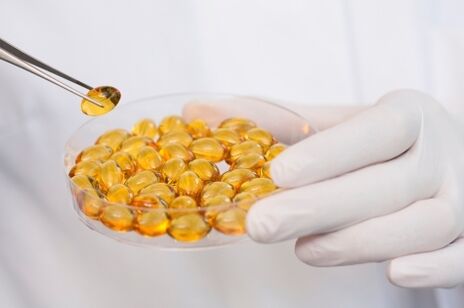What is Lipoic Acid? It is a light yellow powder with a bitter taste that is easily confused with hundreds of other chemicals. However, the unique qualities of the extraordinary combination of fatty acids and sulfur make you pay close attention to lipoic acid: it promotes weight loss, gives the body extra energy, protects the brain, and, perhaps, is the key that will open the door. for man to the land of eternal youth. . . Interested?

Lipoic acid is known to increase the effectiveness of exercise for weight loss at certain times. How else can it help the body?
Lipoic Acid: A Cleanser or a Special Forces?
Lipoic acid, also known as LA, it’s also thioctic acid, it’s also lipamide, it’s also vitamin N which often appears under the name of a semi-vitamin or vitamin substance.
The fact that LA is synthesized by the human body prevents it from being a "full" vitamin. It’s also interesting that lipoic acid is soluble in both fat and water, while its other counterparts in "vitamin activity" can boast just one comfortable habitat.
Lipoic acid is the real Figaro: it’s here, it’s there. By accompanying enzymatic reactions in the mitochondria, it helps make the process of getting energy by cells as efficient as possible.
Lipoic acid molecules - small recycling plants. The substance "takes" the product of the breakdown of amino acids and allows you to squeeze out of it the absolute maximum of substances needed by our body, and then remove all the "waste stones" from the body.
In recent years, serious physicians began to talk about lipoic acid as the elixir of the future of eternal youth, because it is this substance that during experiments proved its ability to prevent DNA damage, which is recognized as the real cause of cellular aging and extinction of vital functions.

Lipoic acid and weight loss: why it works
Lipoic acid is able to "tame" the power that makes us gain weight and retain excess fat. Its activities in this capacity are multifaceted. So, when losing weight, lipoic acid:
affects areas of the brain responsible for appetite, reduces hunger;
stimulate energy consumption;
increase insulin sensitivity;
qualitatively increases the absorption of glucose by cells, reduces its level in the blood;
reduces the liver’s tendency to accumulate fat.
Practice shows that lipoic acid gives the best results in weight loss in combination with changes in diet and physical activity. There is a logical explanation for this. With "changes in the course" of the diet, chemical changes occur in the body (most noticeable when following a protein, paleo or keto diet, which gives the fastest results and the most noticeable side effects), and with increased strength and cardio exercise, microtraumas occur in the muscles. .
Because of this, oxidative processes are intensified in the body, causing a "surge" in the formation of free radicals, damaged molecules.
So lipoic acid is not only able to neutralize it, but also absorb it, and then - to recover and once again rush into the battle of antioxidants.
This is another unique quality of lipoic acid: it is the only "reusable" antioxidant.
In addition, vitamin N has friendly properties: lipoic acid is able to work with other substances that fight free radicals (vitamins C and E, as well as glutathione) and also enhances the action of its allies.
Is alpha lipoic acid the first?
For the first time, researchers successfully extracted lipoic acid from beef liver cells in the fifties of the last century. Thus, alpha-lipoic acid for weight loss began his "medical career" as a hepatoprotector. However, scientists are beginning to discover more new properties of the amazing material and, in addition, are learning to synthesize it qualitatively under laboratory conditions.
Today chemists produce for different purposes two chemical variants of "mirror -like" lipoic acid - R ("right isomer") and S ("left isomer"). There are some differences in their molecular composition, and the human body efficiently and almost completely assimilates only type R lipoic acid.
The latest method makes it possible to achieve higher drug purity and higher concentrations of R-lipoic acid. It is clear that such a material has great potential for all properties inherent in LA; in addition, it has been proven experimentally that it is the R isomer that increases cell sensitivity to insulin. However, the production of pure R-variant materials is quite expensive, which, of course, affects the cost of the product.

The most popular has been the more affordable alpha-lipoic acid, in which the "right isomer" and the "left isomer" are in equal proportions.
Products that contain natural lipoic acid
entrails: kidneys, heart, liver;
Vegetables: broccoli, spinach, Brussels sprouts, beans, tomatoes;
Other sources: brewer's yeast, brown rice.
When your strength is not enough
Many living organisms (including humans) are able to synthesize a certain amount of lipoic acid on their own - this explains the fact that high concentrations of this useful substance are found in the internal organs of animals.
Unfortunately, you don’t have to rely entirely on LA food sources: as described by American expert in functional nutrition Dr. Jeffrey Webb, our enzymes cannot "break" the bond between alpha lipoic acid and the amino acid lysine, in the company of which lipoic acid moves around the gastrointestinal tract in the form of food. Therefore, instead of an ALA -rich dinner, we will receive only fragments of valuable ingredients.
The question arises: if people can produce only a small amount of lipoic acid, and with food they can obtain less, as we live until now, so that doctors have learned to synthesize it?
The answer is simple: a happy organism that does not suffer from metabolic disorders, is not prone to obesity and does not accumulate the entire load of free radicals, is quite able to survive with that amount of free alpha-lipoic acid. But deteriorating ecological conditions and the rapid decline of eating habits in the 21st century are bringing lipoic acid out of the shadows forward.
If you need the help of substances that are simultaneously antioxidants, water -soluble vitamins and fats, stimulants of lipid metabolism and, as a bonus, protectors from degenerative brain disease - talk to your doctor about the possibility of taking alpha -lipoic acid supplements as a supplement.
Lipoic acid: how much to take
The standard recommendation your doctor can give for alpha-lipoic acid as a support and tonic is 25 to 50 mg a day. But it can vary depending on the purpose of use of substances such as vitamins and the state of health of the "host".
Those who practice increasing sports load for weight loss may be prescribed to "eat" 100-200 mg of alpha-lipoic acid, often as part of a complex preparation that also contains L-carnitine (levocarnitine). LA enhances the effects of this natural anabolic "fat burning".
It should not be forgotten that such supplements are taken in a strict time -limited course, so as not to "accustom" the body to continuous intake of substances that stimulate metabolism and do not cause withdrawal syndrome, fraught with rejection of the body. to produce these materials themselves.
Since lipoic acid has the ability to maintain the action of insulin and even partially take over its function in several processes and responses, diabetics are often given higher doses, than 400 mg of LA per day.
Well-known neuroscientist David Perlmutter, author of The Brain Nutrition Diet, considers 600 mg of alpha lipoic acid a must-have for anyone interested in preventing neurodegenerative diseases and clearing up the effects of fast carbohydrate abuse over the years.
In a recent American experiment, alpha-lipoic acid, taken at a dose of 1, 800 mg daily for 20 weeks, helped lose 9% of body weight without changing diet in highly obese patients.
If you decide to spend money for a more progressive and expensive R-isomer of lipoic acid, the dose should be reduced by half due to its high bioavailability.
It should be noted that for all uses of lipoic acid, its overdose can cause indigestion and nausea, increased skin sensitivity and muscle pain, as well as a strong decrease in blood sugar levels with all the accompanying "shocks" such as weakness, dizziness. and severe starvation.
Therefore, be sure to consult your doctor before going to the pharmacy to get a large set of lipoic acid for rapid weight loss: a specialist will help determine its effective and safe dosage for you, your slimming and your health.
During the period of taking lipoic acid, alcohol is strictly prohibited. For best absorption, the supplement should be taken 60-30 minutes before a meal or at least an hour after a meal.
Significant and noticeable results from taking the substance appear no earlier than after eight weeks.































